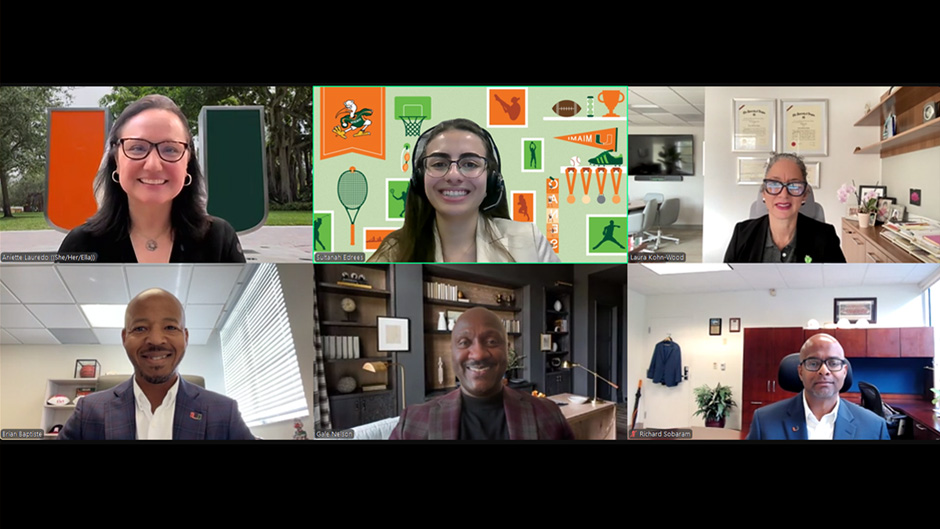Amidst a background of cataclysmic change to the field of higher education, a trio of University of Miami leaders discussed their evolution as leaders, while sharing insights and inspiration on a virtual panel held Feb. 25 and hosted by the University’s Talent and Organizational Development (TOD).
“Disruptions used to be every couple of months but now seem like every hour. Yet we know that change is constant, and so it’s important never to get too high on the highs and definitely never get too low on the lows,” said Richard Sobaram, associate vice president of Housing and Residential Life.
“With success you want to celebrate the wins, but don’t ever declare victory and never stop innovating,” he added. “And on the flip side, when things are bad, never allow yourself to get bogged down because nothing lasts forever. It’s so much about building a strong culture because the ones who are going to get through are the ones whose house has a strong foundation—that’s true in our personal lives and in the workplace.”
“Leadership Insights: Reflecting on Progress and Shaping the Future,” marking the sixth annual seminar, was moderated by Brian Baptiste, senior deputy director of Miami Athletics, and included participants Laura Kohn-Wood, professor and dean of the School of Education and Human Development; Gale Nelson, president and CEO of Big Brothers Big Sisters of Miami; and Sobaram. TOD senior program manager Aniette Lauredo and program coordinator Sultanah Edrees assisted the facilitation.
Kohn-Wood likewise emphasized the current perils and the importance of leaning into values of service to others.
“This is the second time in my 30 years in higher education that it feels so big,” said Kohn-Wood. “But we have to remember that we got through COVID—and back then we didn’t know if we’d even have a university. But we learned things, so it’s important to think about these disruptions as a point of opportunity and creativity. We have to get past the ‘scary’ and look for the options that we have control over and that might allow us to emerge with something that works better for everyone.”
Baptiste peppered the participants with questions about strategies for personal and team success, balancing personal well-being with workplace demands, how their roles support the University’s mission of transforming lives through education, research, innovation, and service, and lessons learned, among others.
“I believe with every fiber of my being the power of education to change peoples’ lives through social mobility. That’s the value I always go back to, particularly in times of disruption and challenges,” said Kohn-Wood, in highlighting how that truism has manifested in her own life. “Find that thing that you deeply believe in and translate it into your daily life so you can remember, ‘Why am I doing this? Why does it matter?’”
Sobaram emphasized “being authentic” as his core value.
“Always try to be true to yourself. Fight that urge to just fit in and instead show up as your authentic self and let the world see you for who you really are,” he said.
Nelson highlighted his own trajectory, rising from a challenging childhood to become the CEO of Big Brothers Big Sisters of Miami, and shared a number of pithy insights, including the need for leaders to exercise the “three Vs of leadership”—to be visible, vocal, and visionary.
Learning to say “no” is among his biggest learning lessons.
“I’ve learned over many years to invest more in myself and to let go some of the priorities of other people,” Nelson said. “We have to be deliberate and purposeful. I’m better for myself and for my family when ‘no’ is an answer—though of course I’m respectful when I say that. But the one thing I won’t let go of is myself.”
Baptiste echoed the importance of pursuing values that are nonnegotiable, especially when navigating challenging times.
“It’s important to understand your core values. Someone once said to me that you should have values of conviction, not values of convenience,” Baptiste said. “At times we can get caught up thinking about a job title, the employer we work for or the name.
“But we need to understand those things that we value that are nonnegotiable for us and to take the time from a self-reflection standpoint to align with our courage and compassion so that we can build trust with those we work with,” Baptiste said.

